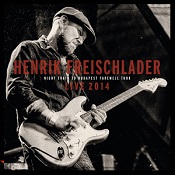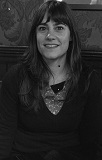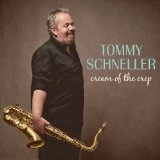 It’s only a couple of years ago that Henrik Freischlader announced his retirement, going out with an album and a farewell tour in 2014. Since then he’s concentrated on production duties for his Cable Car Records label, releasing albums by Tommy Schneller and Layla Zoe. The good news for guitar fans is that he’s back, with the new album “Openness” and a tour to support the album. He’s back to working in the power trio format with Carl-Michael Grabinger (drums) and Alex Grube (bass) and sounding as good as ever. There are some clues in the lyrics as to the reasons for the sabbatical but, hey, it’s good to have him back; there aren’t many players who can boast his technique, power and soul.
It’s only a couple of years ago that Henrik Freischlader announced his retirement, going out with an album and a farewell tour in 2014. Since then he’s concentrated on production duties for his Cable Car Records label, releasing albums by Tommy Schneller and Layla Zoe. The good news for guitar fans is that he’s back, with the new album “Openness” and a tour to support the album. He’s back to working in the power trio format with Carl-Michael Grabinger (drums) and Alex Grube (bass) and sounding as good as ever. There are some clues in the lyrics as to the reasons for the sabbatical but, hey, it’s good to have him back; there aren’t many players who can boast his technique, power and soul.
The album’s opening song, “Openness”, sets the scene perfectly with a huge funky riff, a rasping blues vocal and a lyric about escaping from the past (he’s ‘overdue to be back on track’) and a squalling solo beginning and ending with waves of feedback. There’s a downshift for the second song, “Early Morning Blues”, which shuffles along through some interesting chord runs with a languorous vocal and a clean jazz tone for the solo. You know you’re in the presence of a master, and there’s confirmation when the ‘dust my broom’ reference heralds a blistering slide solo in “Lord Have Mercy” and in the chugging, overdriven riff of “Business Straight”, leading up to a wah wah solo that builds through slow chord runs to single notes flying out in squalls and flurries.
The album’s next three songs develop the lyrical themes of rebirth, redemption and responsibility that permeate the album, particularly the jazzy “Master Plan” with its unpredictable solo and rhythmic switch and walking bass towards the end of the song. The slow ballad “Never Really Left You” demonstrates Henrik’s powerful soul voice and could be addressed to a lover or the audience he gave up for a short time, while the riff-driven “Nobody Else to Blame” talks about ‘falling in love with me’.
“Techno” is a plea to bring back more of the raw edges and imperfections to life, driven along by a massive riff and emphasising the rawness with a clanging, atonal solo and “High Expectations” is a power trio blues about the difficulty of living with a professional musician, while the funky “Today I’m Gonna Change” channels the great Albert Collins with jazzy chords and a cleanly-picked solo. The two slower songs towards the end of the album, “Senses” and the resonator-backed “His Love” suggest that Henrik’s found a meaning or a purpose, whether it’s a god or something else to believe in and give meaning to his life.
Whatever he’s found, it’s working really well for him. “Openness” shows all of Henrik’s versatility as a guitar player, singer and songwriter. Welcome back; we’ve missed you.
“Openness” is out now on Cable Car Records (CCR 0311-47).
 It came as a bit of a shock last year when Henrik Freischlader announced that he was undertaking his farewell tour in support of the “Night Train to Budapest” album. To UK fans, the announcement seemed to come out of nowhere but whatever Henrik’s reasons are, you have to respect them and make the most of the fairly substantial legacy that’s already out there. As a parting shot, he’s pulled together some live recordings from the final tour for release as “Night Train to Budapest Farewell Tour – Live 2014” which is released on Cable Car Records on Friday March 27th.
It came as a bit of a shock last year when Henrik Freischlader announced that he was undertaking his farewell tour in support of the “Night Train to Budapest” album. To UK fans, the announcement seemed to come out of nowhere but whatever Henrik’s reasons are, you have to respect them and make the most of the fairly substantial legacy that’s already out there. As a parting shot, he’s pulled together some live recordings from the final tour for release as “Night Train to Budapest Farewell Tour – Live 2014” which is released on Cable Car Records on Friday March 27th.
I was quite critical of Henrik’s previous live CD, mainly because it was spread over four CDs and felt a bit unfocussed. “Live 2014” is very different. It comprises ten tracks on one CD and it’s all (apart from a small excerpt) original material. When you’re a supremely gifted player like Henrik, it’s tempting to throw in a cover as a crowd-pleaser but it can be a distraction; there’s none of that here. As you might expect from the title, songs from “Night Train to Budapest” predominate; “A Better Man”, “Everything is Gone”, “Point of View” and “Gimme All You Got” all feature, while there are two each from “Get Closer” (“Too Cool for Me” and “Keep Playin’”) and “The Blues” (“Disappointed Women” and “She Ain’t Got the Blues”) and one from “Recorded by Martin Meinschäfer”, the slow, powerful closer “Desert Love”.
As a closing statement from Henrik, it’s pretty good. The band are excellent throughout, Dirk Sengotta (drums) and Theofilos Fotiadis (bass) providing a solid platform for the melodies and improvisations of Henrik and Moritz Fuhrhop (keyboards). The songs showcase Henrik’s voice (very under-rated, in my opinion) and his guitar mastery across a variety of styles from the straight raucous blues of “She Ain’t Got the Blues” through the funkier “A Better Man” to the slow controlled power of “Desert Love”. He nails the fast stuff, but his mastery of the slow and soulful is complete; there isn’t a modern guitar player I would rather hear playing slow and emotional. Because this is a live set, the emphasis is very much on the playing (which is exceptional) and sometimes the songs and the vocals lose a bit of value. I would have loved to hear something from “House in the Woods”, which was a very strong set of songs. Maybe “Breaking my Heart Again”, a powerful song with a great vocal.
I’m sorry that Henrik has decided the band thing isn’t working for him but it’s good that he’s still involved in Cable Car Records as a musician , writer and producer. If the label continues to release artists as talented as Layla Zoe, Linda Sutti and Tommy Schneller, then he’s still making the world a better place.
“Night Train to Budapest Farewell Tour – Live 2012” is out on March 27th on Cable Car Records (CCR 0311-45).
 In November 2014, we reviewed “Wild Skies”, Linda Sutti’s debut album, released on Cable Car Records and produced by Henrik Freischlader. Allan was really impressed by the album so when we discovered that Linda was in London for a few days just before Christmas, we sent him out to the wilds of Camden (well, The World’s End) to have a chat with her about her first album, working with Henrik Freischlader, her songwriting influences and a few other things as well. This is what happened:
In November 2014, we reviewed “Wild Skies”, Linda Sutti’s debut album, released on Cable Car Records and produced by Henrik Freischlader. Allan was really impressed by the album so when we discovered that Linda was in London for a few days just before Christmas, we sent him out to the wilds of Camden (well, The World’s End) to have a chat with her about her first album, working with Henrik Freischlader, her songwriting influences and a few other things as well. This is what happened:
AM – So, you’re from Piacenza in Italy, you sing and write in English and your album was produced by a German, Henrik Freischlader; how did that all happen?
LS – I don’t know; I’ve tried to figure out how it worked out but I still don’t know. I had many chances to make music and I was always in love with English as a language and that’s why I started to write in English. Also, I was a member of a blues band and it’s unusual to write Italian blues; as for the German thing, it was just good luck to meet Henrik.
AM – I suppose if you sing in English, it gives you a wider audience as well.
LS – That wasn’t the main reason; I didn’t think of anything other than my love for English music and American-English music and songwriting in general when I was writing my songs.
AM – So that actually brings me quite neatly on to the singers and songwriters you listened to when you were younger; who influenced you?
LS – I loved and I still love the British folk scene, Sandy Denny and Fairport Convention and Donovan and generally the music of the sixties. That’s why I fell in love with folk music after flirting first with the blues.
AM – From the album sleeve notes, it looks like you were into music from a very young age; is that right?
LS – In my very first band, when I was sixteen, I was playing with another musician and we played covers in English and Italian and I wrote two songs in Italian and then, with other musicians we formed a blues band when I was eighteen/nineteen years old.
AM – It also sounds like your family really supported you as well.
LS – Yeah, very much. My father used to play guitar in a band when he was younger; he had a big band called Sunflowers but they weren’t famous at all. It was very fashionable in Italy at that time to have a big band at that time and, yes, my family has supported me all the way.
AM – On your first album, “Wild Skies”, there are some great arrangements from Henrik; did you have a lot of songs before that you were performing before that as solo acoustic songs.
LS – Last October (2013), I was invited to Opole Songwriters Festival in Poland and that was my first chance to play my songs outside Italy.
AM – I’ve been reading a very good book recently, exploring the ways different songwriters work (“Isle of Noises”) and I wondered how you approach songwriting.
LS – I don’t have a particular recipe; I don’t really have a structure. Basically it comes from the music; I start with a chord progression and some words will come out and then I try to fill in the blanks.
AM – A lot of it sounds very personal in the singer/songwriter tradition of the seventies; James Taylor and Carole King. Do you write about your own life?
LS – Yes, of course, from my personal life and from my friends’ life stories because it’s easier to express ideas about being single, for example, if I write while I’m single.
AM – I have to ask; what was it like working with Henrik on the album?
LS – It was great because I really felt from the start that he understood what I wanted to express, not only with my music and songwriting, but also with my idea of being an artist. Also Cable Car Records is very careful about the personality of the artist. It was amazing and I learned many things about music and about working in the studio, so it wasn’t only about making an album, it’s about growing as an artist and a person; it was great.
AM – And he’s a great player, isn’t he?
LS – Yes, he’s amazing and me and the other artists on Cable Car are so lucky because he plays bass, drums and guitar so when you start to work, he knows everything about the song and he has it all in his mind so you can trust him from the start.
AM – I’ve always had this idea that Henrik works that way; he doesn’t think about different parts, he hears the whole thing in his head.
LS – Yeah, it’s amazing. And the backing vocals as well; he does all the backing vocals on the album.
AM – And what was it like touring with Henrik on his final tour?
LS – It was very special because, as you say, it was the last tour, so I was very honoured. I really felt that the audience was very close to him and it was great to be a part of that atmosphere. For me as an artist, it was a great moment and a great occasion to grow and learn.
AM – And I know that Henrik’s audience is open to listening to different styles of music and I imagine they gave you a good welcome.
LS – I was very grateful to play to the audience and I knew that, me and Henrik, we have different styles (and volumes, we all know how powerful the band and Henrik’s playing is) but the audience was great with me because Henrik allowed them to make room for my music. He always introduced me before he played and I appreciated that very much. I think the audience was also prepared because he produced the album (“Wild Skies”).
AM – I think what Henrik has done this year with Cable Car, with Layla Zoe, Tommy Schneller and yourself is great; he’s produced a wide variety of albums and they all work perfectly.
LS – (laughs) Thanks.
AM – The strings on the album were great as well, weren’t they?
LS – It was a particularly moving afternoon when we recorded the strings; they’re played by two musicians, one plays violin and one plays cello and the parts they wrote sound like an orchestra. It was amazing.
AM – So that’s the first album done now, where to next?
LS – I don’t know; I’m still focussed on promoting this one. I hope I’ll be touring this album soon. I have many songs in store but, you know, you have to move one step at a time.
AM – Well, let’s hope we get to see you in the UK sometime soon; that would be something to look forward to.
LS – (laughs) I would love it; I’m ready. If you want me call me, I’m here.
AM – There are certainly a few places in London and around the UK where your music would work really well.
LS – I’m looking for places but there are so many musicians here so I think I may have to wait a while.
AM – Well, we’re looking forward to seeing you.
 “Wild Skies” is the debut album from Linda Sutti, who is from Piacenza in Italy, but writes and sings in English. Her co-writer and producer on the album is our old friend, Henrik Freischlader, who is German but also writes and sings in English. Following his usual pattern, Henrik not only co-writes and produces the album but also plays drums, guitars and bass. The studio line-up is completed by Omer Klein (keys), Christopher Huber (violin), Cornelius Thiem (cello) and Johannes Krayer (pedal steel).
“Wild Skies” is the debut album from Linda Sutti, who is from Piacenza in Italy, but writes and sings in English. Her co-writer and producer on the album is our old friend, Henrik Freischlader, who is German but also writes and sings in English. Following his usual pattern, Henrik not only co-writes and produces the album but also plays drums, guitars and bass. The studio line-up is completed by Omer Klein (keys), Christopher Huber (violin), Cornelius Thiem (cello) and Johannes Krayer (pedal steel).
Linda’s style is conventional singer-songwriter lyrically while the music moves through jazz and light rock and towards a more poppy sound (but definitely without any EDM). Her voice is strong and distinctive and she’s equally effective on the intimate and raucous ends of the scale with touches of Rickie Lee Jones and Norah Jones (who both had pretty memorable debut albums) at various times.
The album’s opener, “Hurry”, does just the opposite; it’s an appeal from a lover to relax and wind down, but the singer isn’t having any of it. It’s a medium-tempo laid-back jazz groove with what I can only describe as a chauffeur’s gear change towards the end; it’s certainly a lot smoother than the truckers’ variety. “Try” is the most obvious single and pop tune on the album, with a hint of Suzanne Vega vocally and a lighters-in-the-air chorus. The title song, “Wild Skies”, and “Every Tick of Our Time” are both from the introspective 70s singer-songwriter tradition with the former featuring some subtle electric piano and a tempo change to emphasise the chorus while the latter has a beautiful string section intro leading into a song backed with only acoustic guitar.
“Down on the Road” is the album’s ‘get out of my life’ song with a 60s psychedelic backing that Julie Driscoll and Brian Auger would have been proud of, and is followed by the acoustic piece “For the Thrill” which, for me, is the weakest song on the album. “Silence” is a pretty successful attempt to capture a fleeting moment and features some lovely subtle rhythm guitar from Henrik and a couple of very nice hooks to pull you into the verses. “Prince Coffee” uses stirring a cold cup of coffee as a metaphor for trying to make a relationship work and it just about succeeds, with a little help from the polka-tinted arrangement.
“Ordinary Life”, with its minimalist backing deals with a common problem for musicians (or any kind of performing): the paradox of the wisdom and the impossibility of maintaining a meaningful relationship with a civilian, which seems to be resolved in the only song on the album written entirely by Henrik Freischlader, “Dear Mr So-and-So”. The funky guitar and keys along with Linda’s robust delivery create a sound which could be Rickie Lee Jones at her best. The final track, “No Fear”, hints at the 70s pop/folk crossovers of artist like Rab Noakes and Gerry Rafferty (and more recently John Tams) combining folk roots with electric instrumentation to good effect.
Overall, it’s a very varied and listenable album, which you would expect with the involvement of Henrik Freischlader, and there are a couple of standout songs which would work on Radio 2 in the UK. Linda Sutti’s voice is strong and convincing throughout and the strings and pedal steel aren’t overused, which increases the impact when they do feature. My only criticism is that the lyrics could occasionally be a bit stronger, which may be down to both Henrik and Linda writing in a second language; I certainly wouldn’t want to try writing a lyric in French. Putting that aside, there’s a lot to like about this album and I recommend that you give it a listen.
Out now on Cable Car Records (CCR 0311-44).
 You have to wonder how Henrik Freischlader spends his spare time, or if he actually has any. Over the last twelve months, he’s released two self-produced studio albums, a four-CD live set and he’s produced albums for singer-songwriter Layla Zoe (“The Lily”) and now this album from saxophonist and singer Tommy Schneller. He also plays guitar drums and bass on “The Lily” and “Cream of the Crop” while providing the music for Tommy Schneller’s lyrics. He’s done a few tours in support of his own albums as well.
You have to wonder how Henrik Freischlader spends his spare time, or if he actually has any. Over the last twelve months, he’s released two self-produced studio albums, a four-CD live set and he’s produced albums for singer-songwriter Layla Zoe (“The Lily”) and now this album from saxophonist and singer Tommy Schneller. He also plays guitar drums and bass on “The Lily” and “Cream of the Crop” while providing the music for Tommy Schneller’s lyrics. He’s done a few tours in support of his own albums as well.
Tommy Schneller’s “Cream of the Crop” is a few steps away from Henrik’s own blues/rock material, with a much greater emphasis on influences from the early rock and pre-rock years in the playing and the arrangements, particularly the use of the three-piece horn section. This album feels a little like a Tommy Schneller showcase, demonstrating his instrumental ability as well as a gruff blues voice, both of which work well across the wide range of styles on display. The album is built around some superb arrangements (particularly for the horns) which sound authentic in each of the styles tackled. Henrik Freischlader’s guitar, bass and drums are augmented by Gregory Barrett (organ), Gary Winters (trumpet), Dieter Kuhlmann (trombone) and a cameo appearance by Moritz Fuhrhop (organ) on the opening track.
The album opens and closes with the straightforward slow blues songs, “Hands in the Air” and “You Don’t Seem to Care” which feature the quality of blues playing we’ve come to expect from Henrik. “She’s So Good to Me” and “Super Hero” are both big seventies-style tunes with classic horn arrangements by Gary Winters which wouldn’t sound out of place on any of the early Southside Johnny albums. Sandwiched between these songs is the title track, a swing pastiche with bragging lyrics which don’t really belong in the twenty-first century. “Ain’t No Maybe” and “What Did I Do” push the funk buttons quite effectively but there are three remaining songs which all stand out for different reasons. “Isn’t it New” is a great pop song complete with a perfect sing-along chorus, while the minor key “Your Somebody Else” (and that’s not a punctuation error on my part or Tommy Schneller’s) features some wonderful guitar lines in the style of Albert Collins and a breathy sax solo from Tommy. “Higher and Higher” has a funky, almost seventies disco, feel and a completely mad instrumental section with the horns having great fun ripping through several stlyes and a trucker’s gear change before leading back in to the verse.
There are some great moments on this album and I certainly want see the band live on the strength of this; the musicianship is flawless and it feels like the musicians are having fun. There are a few great moments but I think the album would be better if Tommy Schneller was looking forward rather than back and if the band were doing what they want to do rather than showing what they can do. If you like your songs served up with Hammond and horns, this is definitely worth a listen.
Out now on Cable Car Records (CCR 0311-43).


